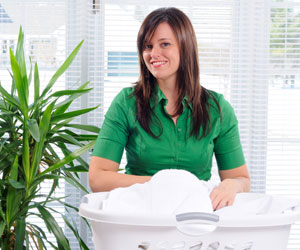
Dump that caddy of toxic potions and make your nest as safe as it is clean
I’ll never forget the moment I found out I was pregnant for the first time: the excitement, the overwhelming joy, and then, of course, the panic. The idea of being responsible for something so small and vulnerable was enough to make me… well, it actually made me open my cleaning cabinets and take a good, hard look at the chemicals that made my house sparkle and smell fresh.
I’d been eating organic foods for years, avoiding toxins from the inside out, but what about the everyday exposure to chemicals I intuitively knew could be dangerous, not only to the planet but to the baby growing inside me? Clearly, going through my household cleaners was the next obvious move.
So there I sat on the kitchen floor, just a few weeks with child, surrounded by the products I’d grown up with. All of them came under review: brightly colored detergents, disinfectants, cleaners, powders, and sprays. I began to read their ingredients lists, although many of the bottles and containers didn’t say what was in them at all, since it’s not required by law; those that did listed ammonia, toluene, formaldehyde, xylene, benzene, and methanol. Say what?
I eventually learned that many of these chemicals are linked to serious health issues. After that, making the switch was easy. (Changing to green cleaners is actually step 2 of Healthy Child Healthy World’s “5 Easy Steps”; check out healthychild.org for more information.) But do non-toxic cleaners really get your home clean? Yes, they do. It just takes time to find the right ones.
The growing green market now offers many wonderful products from Seventh Generation, Mrs. Meyer’s, Shaklee, Method, Begley’s Best, and more, that are formulated to be efficient and compete with their more toxic counterparts. You can even make hardworking cleaning products at home from basic ingredients like vinegar—an excellent window cleaner and fungus-fighter in the bathroom.
Either way, I promise, you’ll feel good knowing that the products in your home get your house clean and are safe for your kids to be around. Find out if your favorite cleaning supplies are safe. The U.S. Department of Health and Human Services’ Household Products Database has ingredients lists for more than 8,000 consumer brands!
— Anna Getty


Leave a Reply